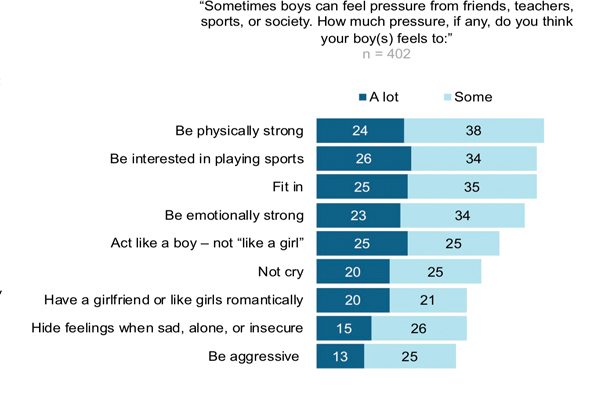Today, on 19th November, we celebrate International Men’s Day.
The theme for the day this year is ‘Better health for men and boys’. International Men’s Day this year focuses on the importance of masculine wellbeing – for both men and boys all around the world. According to a recent report by the Global Boyhood Initiative (GBI), engaging young men in their early years early is crucial to combat toxic male behaviour and achieve gender equality.
BATTLING STEREOTYPES
Like women, men worldwide also battle stereotypes every day, from being asked to “man up” or perceived to be weak if they show signs of emotion. According to the GBI report, two-thirds of US parents feel their boys aren’t comfortable expressing when they’re scared, sad, lonely, or unsure of themselves. Nearly half of the boys surveyed aren’t comfortable expressing love. At least 72% of young men (18-30 years old) in the US say they’ve been told “a ‘real man’ behaves “a certain way'”, which involves being heterosexual, tough and a risk-taker.
The report reveals that young men who embrace harmful masculine norms are five times more likely to bully (verbally, online or physically) or sexually harass someone; and twice as likely to experience depression or suicidal ideation. Boys turn to substances like alcohol and tobacco, drive more recklessly, and engage other kinds of dangerous activities more frequently than girls do. The study found that these and other impacts start quite young.

CREATING A GENDER-EQUAL GENERATION
The GBI’s State of America’s Boys report presents research and expert perspectives and investigates what it is about boyhood that too often plants the seed for such destructive and self-defeating behaviour. It also reveals why open and authentic boys may become more guarded, cynical, and disconnected as they grow.
To raise more connected, emotionally healthy, gender-equal generation, adults must support boys and young mens’ emotional skills, and their ability to build and maintain a network of strong, caring relationships, points out GBI. This will help to create a “more connected, emotionally healthy, gender-equal generation”.
HEALTHY MASCULINITY
While most parents want healthy masculinity – honesty, respect, and emotional health – for their sons, they worry that if their sons show vulnerability, talk about love, show fear, imagine anything other than heterosexual identities, they will be bullied by their peer groups.
Nearly two-thirds of boys said: “my parents taught me that a ‘real man’ should act strong even if he feels nervous or scared.” According to the report, boys at school are expected to receive accolades, acceptance and respect from being rigidly heterosexual, demonstrably athletic, and dominating (of girls and of other boys), emotionally stoic, bold and aggressive, and anti-academic – and that those who deviate are corrected, threatened, even bullied.

Cultural and social norms about masculinity like this, particularly those that restrict emotional expression, confirms the report. They also cause social isolation, undermine boys’ and men’s mental and physical health and are a root cause of violence against women and other men. These norms must be changed to help men create more emotional connection for better mental health, prevent violence and help to achieve gender equality, advises GBI. And engaging young men early is “key for healthy manhood”.
ROLE OF EDUCATORS
So the report calls on parents and educators to tackle these stereotypes and help boys and young men affirm a healthier vision of manhood. When teachers and educators are engaged, paying attention to, seeing and understanding boys, it can support boys to reconnect to their studies in authentic and successful ways, confirms GBI.
The GBI initiative, was launched in the United States a few weeks ago, by Promundo and the Kering Foundation in partnership with Plan International, supported by Gucci’s Chime For Change. This ‘ground-breaking’ research focused on boyhood is just part of the initiative. The GBI initiative aims to equip adults with the tools and resources to raise, teach, and coach boys (aged 4-13) to share emotions in healthy ways, accept and connect with others, stand up and speak out against inequality, and break free from stereotypes.
The initiative is focused on long-term change and aims to impact every level of the child’s environment – at home, school, in the media – to support boys to be healthy, emotionally connected and nonviolent. It also provides recommendations for parents, teachers and caregivers. The GBI initiative plans to expand internationally in 2021 and the goal is ultimately to prevent violence and achieve gender equality globally.
Click here for more information.







































